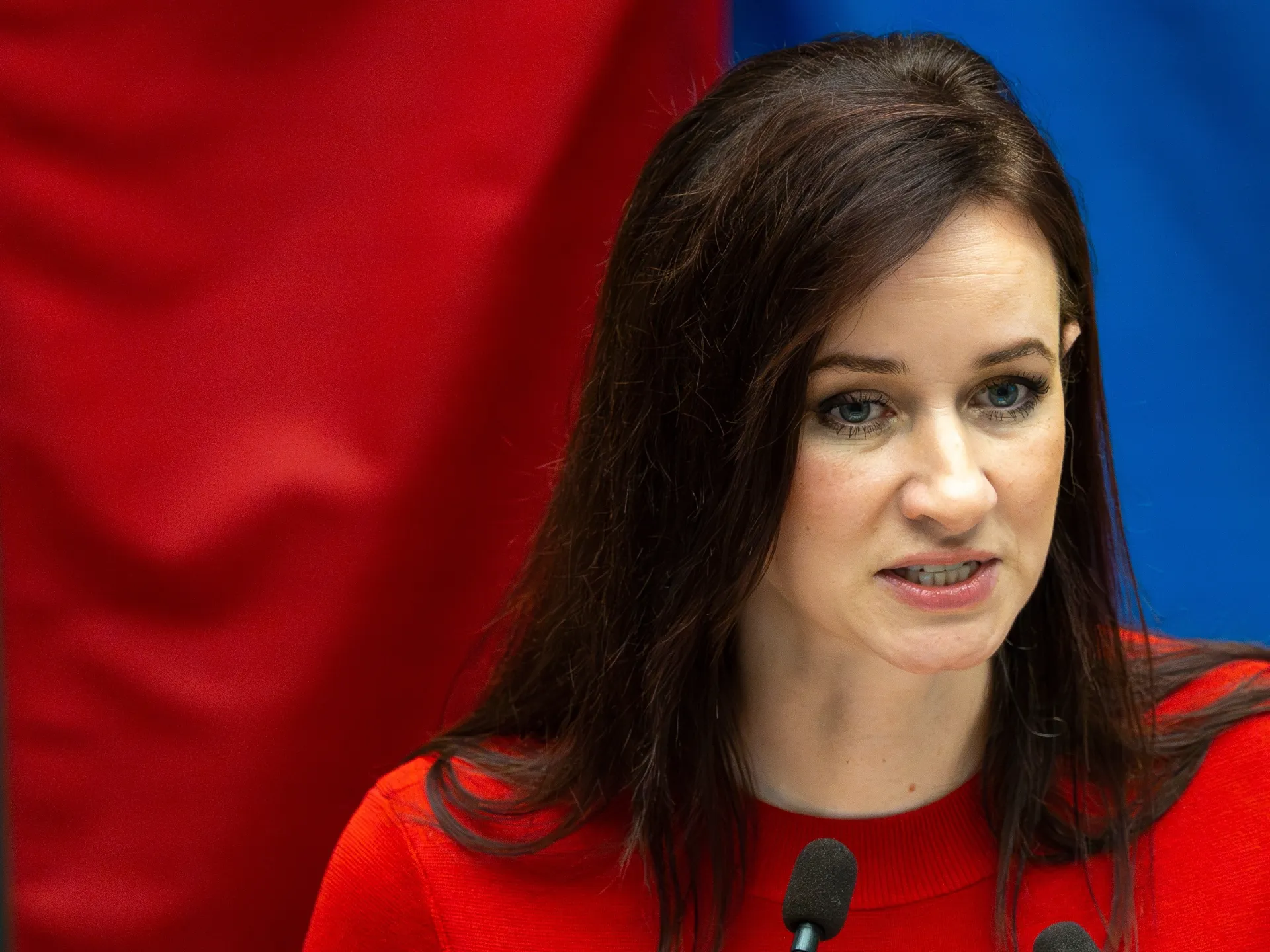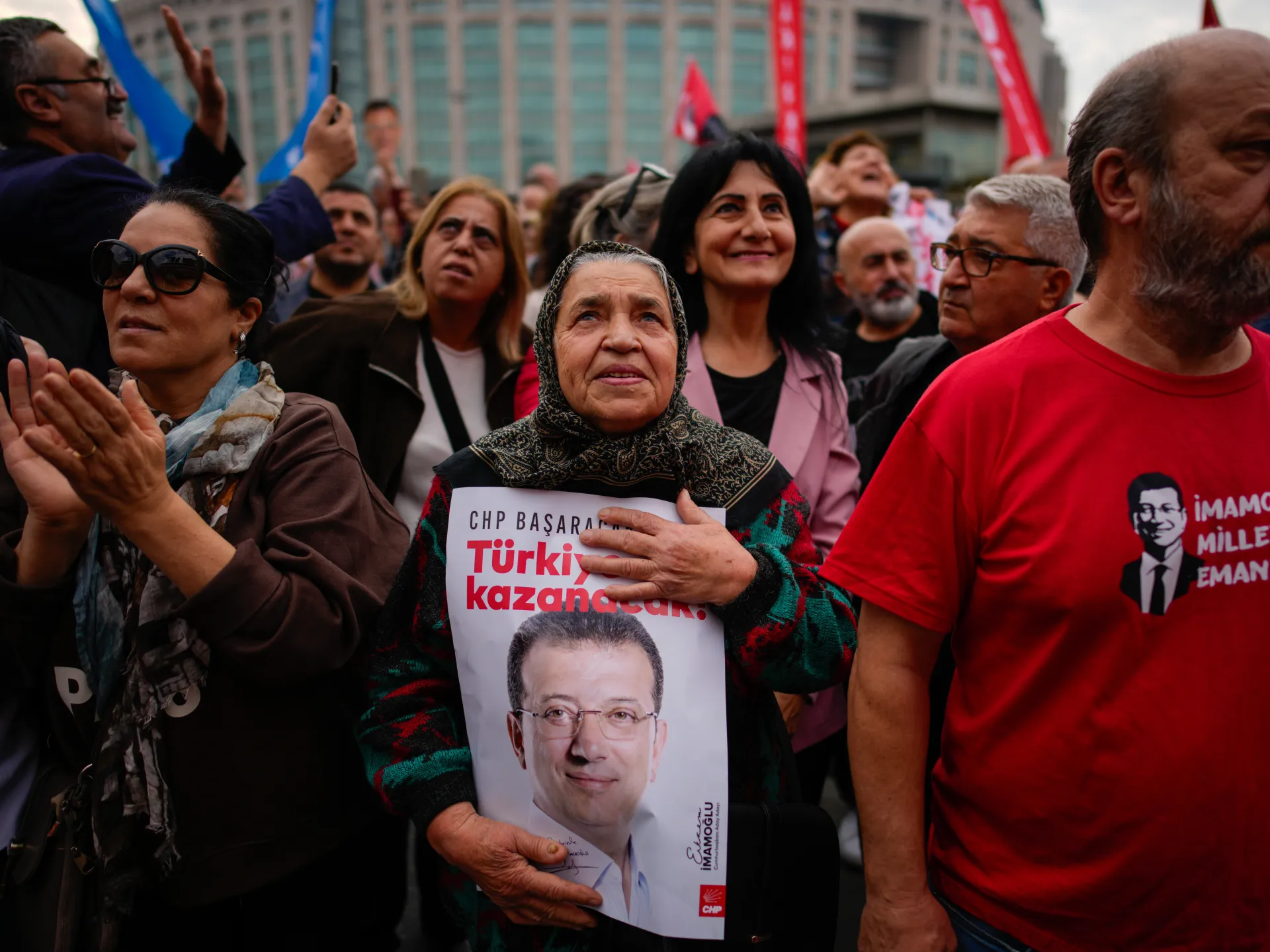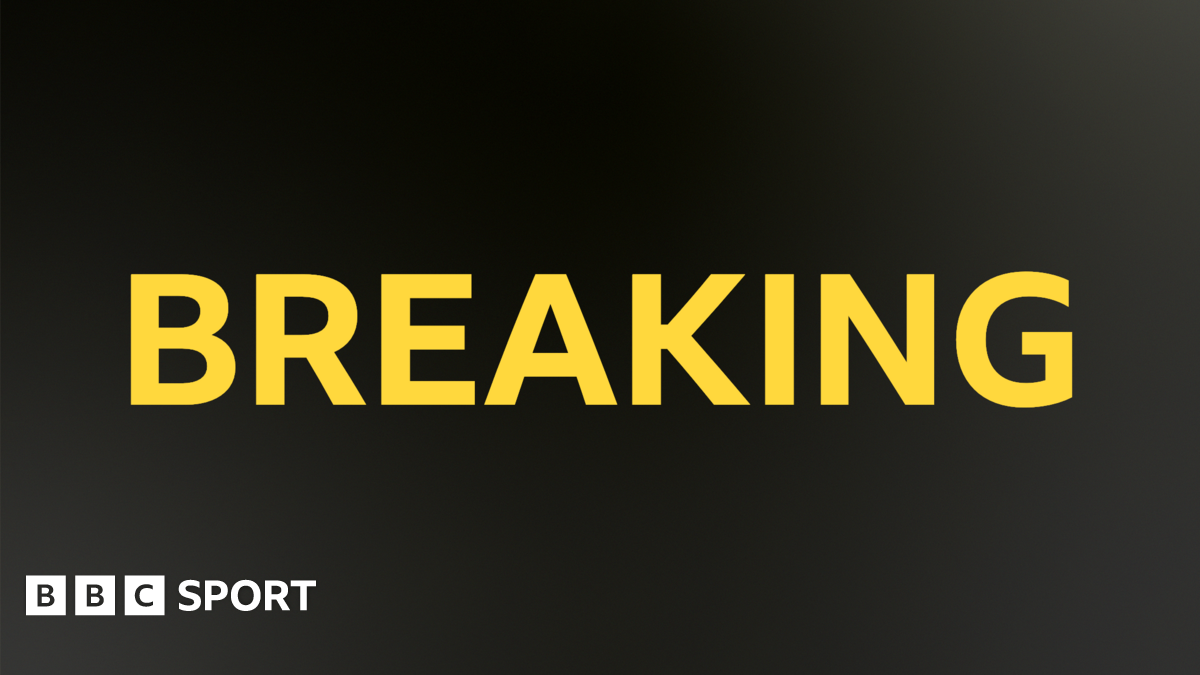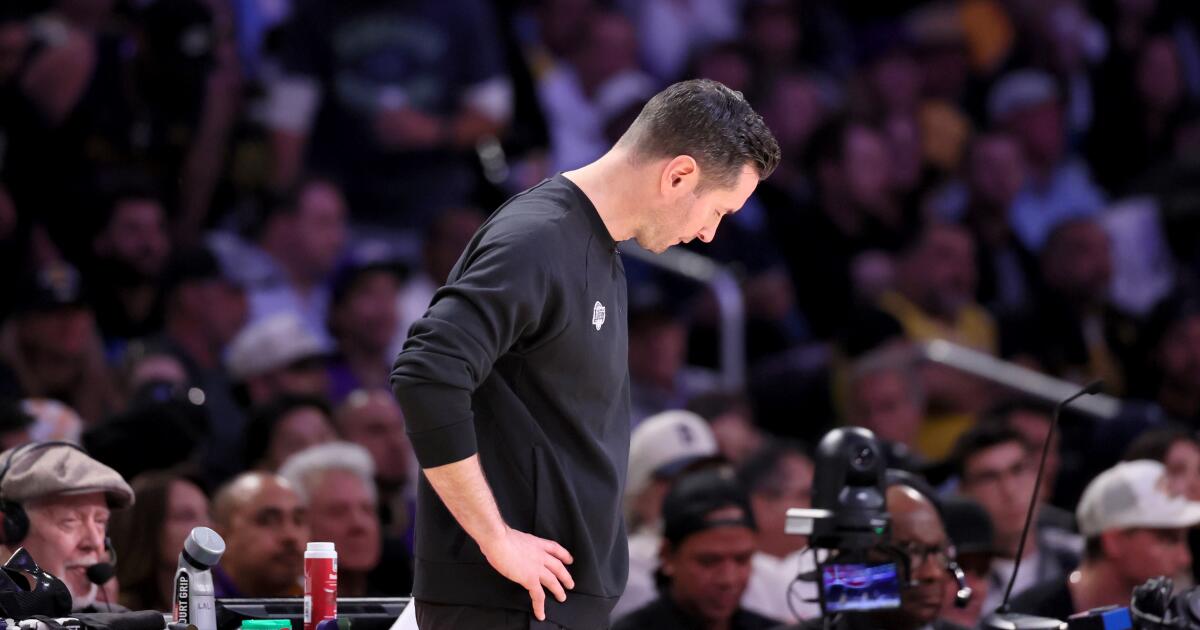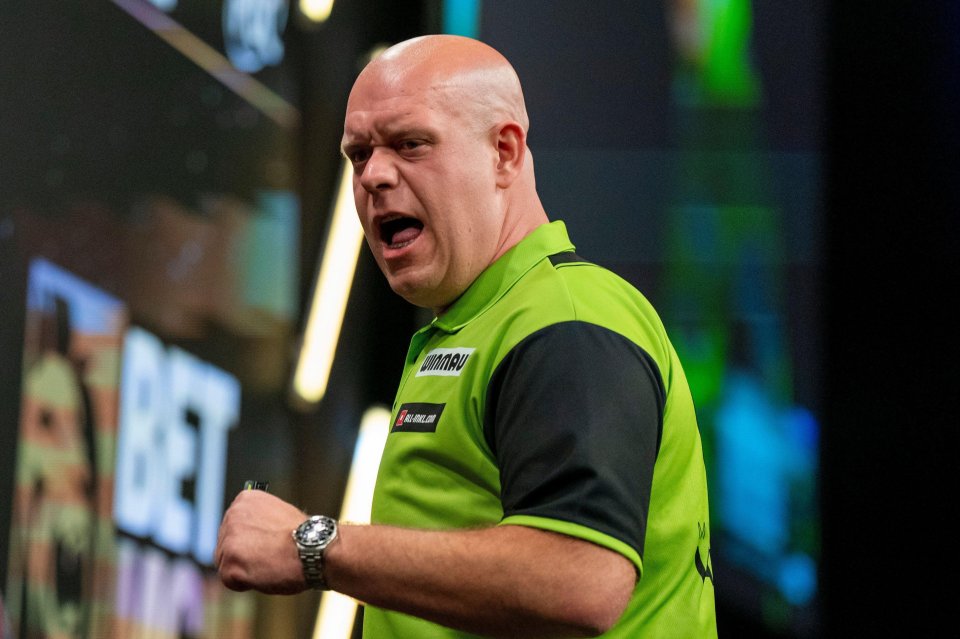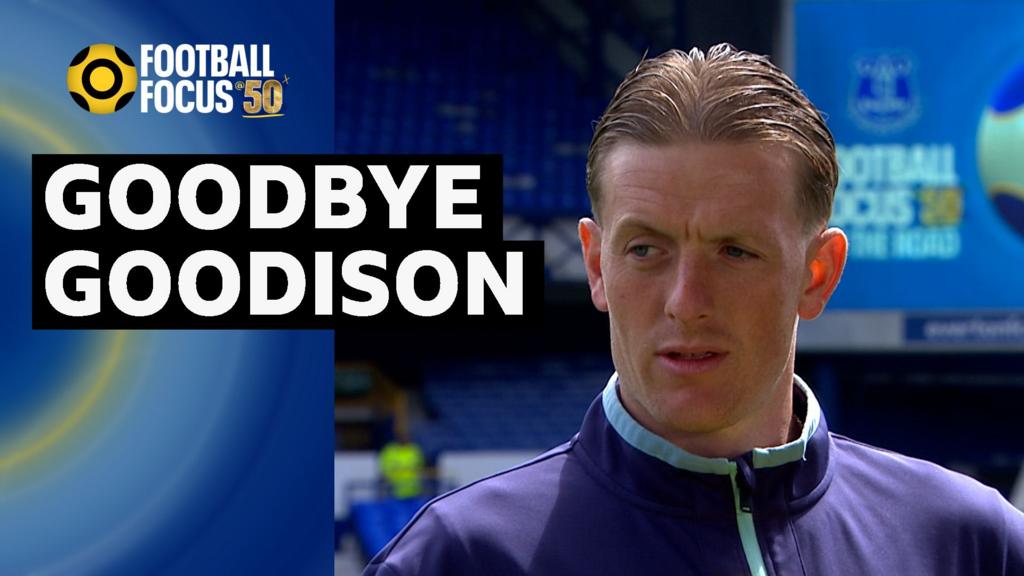Non-league club sponsored by Bonnie Blue forced to RETRACT kit and crowdfund for a new one over FA rule
A NON-LEAGUE football club is looking for a new shirt sponsor after being forced to RETRACT the deal it had with Bonnie Blue.
The controversial adult star Bonnie Blue had become the shirt sponsor for Calstock FC.
The Cornwall-based side shared a kit which featured a “BB” logo that was funded by the 25-year-old.
The logo featured on a new blue away kit rather than the club’s established yellow and black home shirt.
However, the club has now revealed that they are prohibited from wearing the kit due to the FA‘s “interpretation of the regulations”.
A statement read: “Due to the FA’s interpretation of the regulations, we are retracting the kit bearing the BB logo.
“We did not do this to offend.
“We, as an adult club and collective, categorically do not advocate or support the oppression of women.”
The club was hit with criticism on social media but it appears that this has not factored into the decision.
The shirt also featured the phrase, “Up The Bonnie Blue Bees” printed along the back of the shirt.
A GoFundMe page has also been set up to help the club replace the banned shirt.
Blue, whose real name is Tia Emma Billinger, hails from Stapleford, Nottinghamshire.
She rose to fame claiming to sleep with over 1,000 men in just 12 hours.
The infamous OnlyFans model was recently banned from Nottingham Forest’s City Ground.
She had tried to pull a viral stunt when she advertised an offer to “entertain” fans before the visit.
Speaking on the Only Stans podcast: “I thought when they asked me to go to the side, ‘maybe they’re upgrading my tickets, maybe they want to escort me to my seat, this is quite nice, it’s a good service’.
“They asked to see my tickets, I showed them and they took them off me, saying, ‘we’re escorting you off the premises’.
“Apparently, they don’t discriminate against sex workers, but I was banned because I was a sex worker.
“I was going to encourage them (the players), give them a good time.
“I also think if I’m entertaining the supporters it’s less people drinking so I’m actually doing something good for their health.”
Who is Bonnie Blue?
Born in May 1999, Bonnie – whose real name is Tia Billinger – grew up in a small Derbyshire village, and attended the Friesland School in the village of Sandiacre.
She has two half-siblings – a sister and a brother – who have always remained out of the public eye.
She never knew her biological father, and considers stepfather Nicholas Elliott her dad.
Bonnie also became something of a dance star in her local area, and competed in the British Street Dance Championships alongside her sister back in 2015.
She also had a part-time job at Poundstretcher as a teenager.
After school, she began working in recruitment.
In October 2022, Bonnie married Oliver Davidson, who she had started dating when she was just 15.
Once they were married, they moved to Australia, where Bonnie continued working in recruitment.
However, it was in Australia that she decided to pursue a different line of work, and tried her luck as a ‘cam girl’ – crediting Oliver for giving her the confidence to enter the adult entertainment world.
She quickly made a name for herself in the industry, and was soon making £5,000 a week.
But while her work life was going from strength to strength, her relationship was crumbling, and she and Oliver split after almost a decade together.
She moved over to OnlyFans following her cam girl success, and once again found fame on there.
She quickly became a favourite on the site, especially thanks to her “niche” of sleeping with young male students – such as when she bedded 158 students during Nottingham Trent University’s freshers week in September 2024.
Bonnie is now estimated to be worth £3 million, and makes around £600,000 a month on OnlyFans.
Her family are also supportive of her work, with mum Sarah Billinger even claiming she’s her daughter’s PA, and helps clean up after Bonnie’s events – as well as handing out condoms to young clients.
In January 2025, Bonnie claimed to have broken the world record for the most amount of sex in 12 hours, after apparently sleeping with 1,057 men from 1pm to 1am at a secret London event.
2000 Guineas: Ruling Court wins Newmarket Classic for William Buick
Ruling Court won the 2000 Guineas at Newmarket as he held off the fast-finishing Field Of Gold.
The 9-2 shot, trained for owners Godolphin by Charlie Appleby, was the pick of jockey William Buick and proved the right choice.
Stablemate Shadow Of Light led in the closing stages but eventually finished third with another Godolphin runner, Tornado Alert, in fourth.
“This feels great. He was so smooth throughout – he’s a special horse and his stamina shone through,” said Buick of the victor.
Apple approves Spotify update that freely shows clear pricing on in-app purchases

May 2 (UPI) — Spotify said Friday Apple has approved its app update after a federal judge ordered Apple to stop imposing commissions it takes from purchases done through iPhone apps.
“In a victory for consumers, artists, creators, and authors, Apple has approved Spotify’s U.S. app update. After nearly a decade, this will finally allow us to freely show clear pricing information and links to purchase, fostering transparency and choice for U.S. consumers,” Spotify said in a statement.
The order from U.S. District Judge Yvonne Gonzalez Rogers said found apple was “in willful violation” of a 2021 injunction to “restrain and prohibit Apple’s anticompetitive conduct and anticompetitive pricing.”
“Apple’s continued attempts to interfere with competition will not be tolerated,” Gonzalez Rogers said.
Apple said it will comply with the court order but strongly disagrees with the decision and will appeal.
Spotify called it a landmark ruling.
“We can now give consumers lower prices, more control, and easier access to the Spotify experience,” Spotify’s statement said. “There is more work to do, but today represents a significant milestone for developers and entrepreneurs everywhere who want to build and compete on a more level playing field. It’s the opening act of a new era, and we could not be more ready for the show.”
The ruling will allow Spotify’s app update to show consumers pricing details in the app and will allow payment options beyond Apple’s payment system for in-app purchases.
Spotify said the ruling made it clear “that Apple deliberately abused its market power to intentionally harm others and benefit only itself.”
Judge Rogers wrote in her ruling that Apple Vice President of Finance Alex Roman “outright lied under oath” about Apple’s anticompetitive behavior.
The judge referred the matter to the United States Attorney for the Northern District of California “to investigate whether criminal contempt proceedings are appropriate.”
Australia PM Anthony Albanese wins second three-year term | Elections News
Labor Party leader becomes the first Australian prime minister to win a second consecutive three-year term in two decades.
Anthony Albanese has become the first Australian prime minister to win a second consecutive three-year term in two decades, in a dramatic comeback for his Labor Party in a general election dominated by the cost-of-living crisis.
Albanese’s Labor Party was on track on Saturday for an unexpectedly large parliamentary majority, as Peter Dutton, leader of the conservative Liberal Party, conceded defeat and the loss of his own seat.
In his victory speech, left-leaning Albanese pledged to steer the nation through a rough patch of global uncertainty.
“Australians have chosen to face global challenges the Australian way, looking after each other while building for the future,” he told supporters in Sydney. “We do not need to beg or borrow or copy from anywhere else. We do not seek our inspiration overseas. We find it right here in our values and in our people.”

He said the Australian people have voted for “Australian values”.
“For fairness, aspiration and opportunity for all,” he said amid a loud cheer. “In this time of global uncertainty, Australians have chosen optimism and determination.”
Dutton of the main opposition Liberal Party accepted full responsibility for poor election results on what he called “an historic occasion” for the party.
Dutton also lost the race for his own Dickson seat in Australia’s parliament to Labor’s Ali France, a former journalist and communications manager who has pushed for easing the cost of living through tax cuts, cheaper medicine, and investment in public healthcare and education.

Senator James Paterson, a Liberal spokesperson, suggested “the Trump factor” was in play in Australia, in reference to United States President Donald Trump. Trump had cast a long shadow over the six-week election campaign, sparking keen global interest in whether his tariff-induced economic chaos would influence the result.
For Australian voters, the high cost of living, healthcare, housing prices and clean energy were some of the top issues in this federal election.
Reporting from Sydney, Al Jazeera’s Jessica Washington said it was an historic win for the Labor Party.
“There was certainly a message of unity by the prime minister. There was also a short moment during his speech when the crowd began to boo Peter Dutton, and he immediately hushed them and said that wasn’t the Australian way,” she said.
“Labor has pledged to make it easier for young people to buy homes and has also made promises, including a 20 percent cut to student debt. This makes the loss doubly embarrassing for the opposition coalition because they are often seen as the economic managers, but they lost in an election held largely around those issues.”
The election is completing the party’s return to power after it had also managed to secure a parliament majority with 77 seats out of 151 in the House of Representatives in 2022.
After the 2022 election, Labor also secured 25 seats in the Senate while the coalition working against it secured 30, and the Greens took 11.
To form a government, a party needs to win a majority – at least 76 seats – in the House of Representatives. If no party wins an outright majority, the party with the highest number of seats forms a minority government by collaborating with smaller parties or independent members.
Zhao Xintong’s classy act towards Ronnie O’Sullivan revealed after knocking legend out of World Snooker Championship
ZHAO XINTONG made a beeline for Ronnie O’Sullivan’s dressing room after his epic win at the Crucible.
The Chinese star reached the final of the World Championship after beating The Rocket 17-7 in Sheffield.
FOLLOW ALL THE CRUCIBLE ACTION WITH OUR LIVE BLOG
Zhao, 28, is playing his first Worlds since returning from a 20-month ban.
Xintong did not fix a match himself, but was one of 10 Chinese stars suspended in the sport’s biggest corruption scandal in 2023.
O’Sullivan has been a mentor to the 28-year-old, who cites The Rocket among his snooker heroes.
Straight after the match, Xintong went directly to Ronnie’s dressing room.
He reportedly thanked O’Sullivan for his help and support in helping him reach first World Final, before the pair shared a hug.
The Cyclone later wrote on social media alongside a snap of O’Sullivan: “Because of you”.
Despite starting again as an amateur this season, Zhao has stormed up the rankings.
The Chinese star was already set to rejoin the pro ranks with a two-year tour card earned on the Q Tour.
BEST ONLINE CASINOS – TOP SITES IN THE UK
He will now retain his ranking points after a memorable run in Sheffield – and has already guaranteed a cheque for £200,000.
Zhao said: “In the past, when I played Ronnie, I’d get nervous because I really wanted to win.
“But I didn’t put too much pressure on myself this time.
“Today I felt a lot more relaxed and enjoyed it, and I ended up playing pretty well. He gave me a few chances, and I took them.
“Tonight I could feel that the whole crowd was cheering for Ronnie. But honestly, I think he deserves it.
“He’s won here seven times already, and he absolutely has the ability to win an eighth.
“That’s why I told myself not to relax, because I know he’s someone who can come back from almost any scoreline.
World Snooker Championship 2025
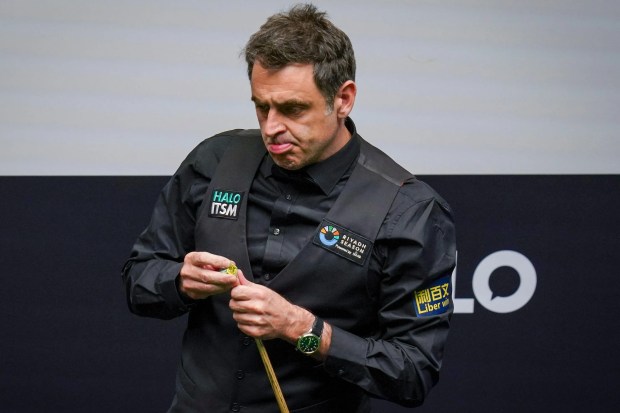
WE are now into the final days of what has been a THRILLING World Snooker Championship!
A new world champion will be crowned this year after Kyren Wilson crashed out in the first round.
Heavyweights such as John Higgins and Mark Selby have also fallen as we head to the final on Sunday and Monday.
Ronnie O’Sullivan was eyeing a record eighth world title but crashed out at the hands of the brilliant Zhao Xintong – who reached the final qualifying as an amateur after his ban.
In the other semi-final, World No 1 and tournament favourite Judd Trump is facing Mark Williams.
Latest News
Snooker Explained
“I just tried to focus on one shot at a time and make the most of every chance he gave me.”
No Chinese player has ever become world champion – but Zhao does not feel weighed down by history.
He continued: “This tournament feels totally unique.
“For Chinese and Asian players, no one has won it yet.
“Every match win here is incredibly difficult. Even though I’ve made it to the final, there’s still a long way to go.”
Why is measles spreading in Canada, Mexico and the US? | Health News
The United States and Canada are experiencing one of their worst measles outbreaks in years, while the virus has also crossed to neighbouring Mexico.
A total of 2,500 cases and four deaths have been reported in the outbreaks across the three countries. Vaccine hesitancy has been blamed.
Here is what we know about the outbreaks so far and why measles cases are on the rise.
What is measles?
Measles is a highly contagious viral illness that starts with symptoms including high fever, cough, runny nose, red or watery eyes, and sensitivity to light. A few days after infection, a red, blotchy rash typically appears on the face and spreads down the body. Fatigue and loss of appetite are also common.
Most people recover within two to three weeks but complications, particularly in young children and those with weakened immune systems, can be serious.
These include ear infections, diarrhoea, pneumonia and brain swelling (encephalitis) which can lead to permanent disability or death. In wealthier countries, measles causes about one death in every 5,000 cases, but in lower-income regions with weaker healthcare systems, the fatality rate can be as high as one in 100.
Before the measles vaccine was introduced in 1963, about 3 to 4 million cases of measles were reported annually in the US, with hundreds of deaths and thousands of hospitalisations. By 2000, following widespread vaccination, measles was declared “eliminated” in the US – meaning there had been no continuous transmission of the disease for more than 12 months. Countries that have eliminated a disease through vaccines are considered to have “herd immunity” as long as vaccines continue to be offered to everyone.
What is herd immunity?
Herd immunity occurs when enough people in a community become immune to a disease, either through vaccination or by recovering from an infection.
The number of people who need to be immune in order to achieve herd immunity for the whole community varies from disease to disease. Measles, which spreads very easily, requires 95 percent of a community to have immunity.
When most people are immune, the disease has a much harder time spreading – meaning it is more likely to die before it can be transmitted to another host. This helps to protect those who cannot be vaccinated for specific reasons, including newborn babies or people with certain health conditions.
Experts say the safest way to maintain herd immunity is through vaccination due to the potentially severe effects of a measles infection.
How effective is the measles vaccine?
According to the World Health Organization (WHO), measles vaccination prevented an estimated 31.7 million deaths globally between 2000 and 2020.
The measles, mumps and rubella (MMR) vaccine, widely used around the world, provides about 97 percent protection against the measles virus, according to public health agencies.
The vaccine is normally given to children in two stages: The first dose at 12 months and the second at about three years and four months of age (when the child is nearing pre-school age), as part of routine immunisation programmes in countries like the United Kingdom.
Breakthrough cases in vaccinated people are rare and usually mild.
Where has measles spread in North America?
North America is experiencing a significant measles resurgence, with more than 2,500 confirmed cases across the US, Canada and Mexico. Three deaths have occurred in the US and one in Mexico. The outbreak began in late 2024 in Ontario, Canada, before spreading to Texas and northern Mexico in early 2025, with Mennonite communities (Anabaptist Christian congregations), a historically under-vaccinated population, being the hardest hit.
A WHO report in April stated that measles cases in the Americas during the first three months of this year were 11 times higher than during the same period in 2024. The region now faces a “high” risk of measles outbreaks, compared with a “moderate” risk globally, the WHO said.
United States
The US has so far reported 935 confirmed measles cases across 30 states, with Texas being the epicentre of the outbreak, accounting for 683 of those cases. The outbreak has now also spread to New Mexico (67 cases), Oklahoma (16) and Kansas (37).
Three people died from measles between February and April, including two unvaccinated children in Texas and one unvaccinated adult in New Mexico. These mark the country’s first measles deaths since 2015.
In 2019, the US experienced its most significant measles outbreak since 1992, with 1,274 confirmed cases reported across 31 states, but no deaths.
Canada
Meanwhile, Canada is experiencing its worst measles outbreak in more than 25 years. Since mid-October 2024, Ontario alone has recorded more than 1,000 cases.
Canadian officials confirmed that the outbreak had originated from a large gathering in New Brunswick province that involved Mennonite communities, which strive for a simple life and tend to avoid modern technology and medicine.
Mexico
In Mexico, the number of measles cases has risen sharply this year in the northern state of Chihuahua, where 786 cases have been reported so far. Just seven cases were reported in the whole country last year. A 31-year-old, unvaccinated man from Ascension, Chihuahua, died from the disease in early April.
Why is measles spreading?
According to the WHO and the US Centers for Disease Control and Prevention (CDC), the main reason measles is spreading is that fewer people are taking up vaccines. Misinformation and growing hesitancy have seen vaccination rates dropping below the level needed for herd immunity.
In some US states and Canadian provinces, exemptions – giving non-medical reasons for declining vaccines, such as for personal or religious reasons – are becoming more common. This has led to the existence of clusters of unvaccinated people who are more vulnerable to outbreaks when exposed to the virus.
The US CDC reported that during the 2023-2024 school year, exemptions from one or more vaccines were claimed by parents or carers of 3.3 percent of preschool children, compared with 3 percent the previous year. Exemptions were higher in 40 states and the District of Columbia, with 14 states reporting exemption rates exceeding 5 percent.
Health officials point to how closely connected the affected communities in the US, Canada and Mexico are, with people frequently travelling between them. Mennonite groups, in particular, have strong cross-border ties and lower vaccination rates, making it much easier for the virus to spread from one region to another.
Who are the ‘anti-vaxxers’ and what are their concerns?
Anti-vaccine advocates, often referred to as “anti-vaxxers”, oppose vaccinations for a number of reasons, including fears about side effects, distrust of pharmaceutical companies or government agencies, and religious or personal beliefs.
Mennonite groups in Ontario and Chihuahua have also historically been hesitant about taking up vaccines, and health authorities say a significant share of recent measles cases in these areas are concentrated within this population.
One of the most persistent myths driving vaccine hesitancy is the claim that vaccines cause autism. This belief stems from a 1998 study that has since been discredited and retracted.
Will Trump’s pick of RFK Jr as health secretary push vaccination levels down further?
Robert F Kennedy Jr’s appointment as US Secretary of Health and Human Services prompted concern among health experts, particularly as measles cases are on the rise across North America.
Kennedy, a longstanding vaccine sceptic, has repeated false claims that vaccines are linked to autism and that the MMR vaccine contains “aborted fetus debris”.
Health experts have debunked this claim. The rubella part of the vaccine was made using lab-grown cells which were copied from a single foetal sample taken in the 1960s. These cells have been multiplied in labs for decades and are used to grow the virus needed for the vaccine. But the cells themselves are removed during the process, so there is no fetal tissue in the actual shot.
Kennedy has been criticised for downplaying the severity of the current measles outbreak, and for promoting unproven treatments for measles. He has suggested alternatives including vitamin A supplements and cod liver oil, which experts say do not replace vaccination and are not backed by strong scientific evidence.
Kennedy has also made major changes to the Department of Health and Human Services, firing thousands of employees and cutting budgets for key agencies like the CDC, which experts say could weaken the country’s ability to respond to health emergencies.
Beautiful little UK seaside village with a tucked away Michelin star restaurant
Discover Saltwood, a charming Kent village where history meets haute cuisine, home to the two Michelin-starred Hide and Fox restaurant, nestled amid centuries-old heritage
The village of Saltwood in Kent might not be on every traveller’s radar, but that’s part of its charm. This peaceful spot near the coast offers a mix of history, nature and top-tier dining.
Tucked quietly in the Folkestone and Hythe district, Saltwood is a quintessential English village. Think flint-stone cottages, winding lanes, and rolling countryside as far as the eye can see. But there’s more than just postcard scenery here. Food lovers now make a beeline for Saltwood thanks to its standout culinary gem, Hide and Fox.
This Michelin-starred restaurant, discreetly nestled in a converted village shop, has been turning heads for all the right reasons. It’s run by husband-and-wife duo Allister Barsby and Alice Bussi, who bring serious pedigree to the table.
READ MORE: Best restaurants in UK revealed as Michelin Guide 2023 results announced – see full list
Allister hails from nearby Whitstable and brings with him experience from some of the West Country’s top restaurants. Alice, a skilled sommelier and hospitality expert, ensures every guest feels welcomed from the moment they walk in.
The pair have created something truly special, modern fine dining rooted in local ingredients and British tradition. Dishes are flavour-forward, seasonal, and beautifully presented without pretension.
Inside, the vibe is relaxed but refined, white tablecloths paired with warm service and excellent wine. The wine list is expertly curated by Alice, who has introduced unexpected gems from Georgia and Croatia to delight curious palates.
Hide and Fox has earned two Michelin stars and three AA Rosettes, yet it still feels refreshingly down-to-earth. Locals and travellers alike are welcomed with the same genuine enthusiasm.
After your meal, it’s worth taking a wander through Saltwood itself. A scenic walking route called the Saltwood Saunter takes you through Willow Wood and out into the countryside.
History buffs will enjoy spotting the 12th-century parish church of St Peter and St Paul, a beautiful building with stories woven into every stone. Saltwood Castle, dating back over a thousand years, adds even more historical intrigue.
The castle even played a dark role in English history, in 1170, four knights stayed there before riding to Canterbury, where they murdered Archbishop Thomas Becket. Today, the castle is privately owned but remains an iconic part of the village’s past.
Between its scenic charm, historic weight and superb dining, Saltwood punches well above its weight. It’s a true hidden gem that rewards those who take the time to explore it.
Column: The ‘USA’ brand was 250 years in the making. It took just 100 days to trash it
Ken Griffin, one of Republicans’ billionaire donors who’d convinced themselves that President Trump wouldn’t do some things he campaigned to do, finally got it right last week. Griffin inadvertently identified the irony of Trump’s presidency so far: The man who made a brand of his own name (“TRUMP,” all caps) — and a fortune licensing it as a signifier of success on products from hotels to sneakers — has all but wrecked the United States’ brand in 100 days.
“We’re eroding that brand right now,” Griffin lamented at an economic forum. Everything that “USA” has long stood for — financial stability, military strength, cultural prestige and more — undermined. “It can take a very long time,” Griffin warned, “… to remove the tarnish.”
For the record:
5:15 p.m. May 1, 2025An earlier version of this column implied that Ken Griffin donated to the Trump campaign. He has donated to downballot Republican candidates and to the Trump inauguration.
A related sad irony: Trump has rivaled President Franklin Roosevelt, who popularized the “first 100 days” marker, for swift, decisive action out of the gate. But where FDR rescued a crashed economy and envisioned a social safety net that’s endured nearly a century, Trump took what economists considered a “stellar” economy and crashed it, while deputizing minions to tear holes in the safety net and take chainsaws to the federal government and the rule of law.
Lawsuits against the Trump administration proliferate at the rate of two a day, according to trackers, especially over billionaire Elon Musk’s assaults on federal workers and spending laws, and against Trump’s immigration crackdown. The president continues to defy a Supreme Court ruling to “facilitate” the return of a man wrongly deported to El Salvador’s gulag. As J. Harvie Wilkinson III, a federal judge named by President Reagan, wrote for the 4th District Court of Appeals on April 17, “The government is asserting a right to stash away residents of this country in foreign prisons without the semblance of due process.”
Internationally, Trump is wrecking the legacy of Roosevelt’s last days, the global structure of alliances that has been a force-multiplier for the United States against Russia, China and other adversaries. The dollar and U.S. Treasuries are diminished as safe harbors. The toxicity of the Trump-U.S. brand was dramatically evident in elections on Monday in Canada: Prime Minister Mark Carney’s Liberal Party came from way behind to win, as voters took out their disgust with Trump’s Canada-bashing on conservative candidates.
Characteristically, Trump conjures his own self-serving reality. At a MAGA rally in Macomb County, Mich., on Tuesday, he exulted, “This is the best … 100-day start of any president in history, and everyone is saying it.”
No, they’re not. A slew of recent polls show that Trump’s job-approval rating has slid to the lowest of any new president in eight decades, with nearly six out of 10 Americans disapproving of his performance in surveys by Pew Research Center and AP/NORC. On a range of issues, including the two that arguably got him elected, immigration and the economy, Trump now gets negative reviews, including in a Fox News poll.
“We’ve just gotten started,” he said in Michigan. “You haven’t even seen anything yet.”
On that he’s probably right: Worse is yet to come.
Americans seem to think so. On Day 100 came a report that consumer confidence plunged in April, a signal of a recession ahead. On Day 101, Wednesday, came news that the economy contracted 0.3% in the first quarter, after a 2.4% annual growth rate in the previous quarter — the last of the Biden presidency. Stocks tumbled, yet again.
That “golden age” that Trump announced in his inaugural address seems to begin and end with the new bling in the Oval Office.
His tariffs have taken such a toll on businesses and consumers that he softened auto-related levies in time for his Michigan visit. But that only exacerbated the chaos surrounding his “beautiful” tariffs, and the economic uncertainty he’s spawned. And it put the lie to his claims that Americans don’t pay tariffs, China does.
And because consumers pay, Trump had to clean up another 100th-day tariff mess, in aisle Amazon. On Tuesday he phoned CEO Jeff Bezos, another of his billionaire donors, to get the e-commerce giant to drop a plan to show tariff costs on customers’ bills. (They’ll still pay more, they just won’t see the proof.)
Yet 100 days is 99 more than candidate Trump said he’d need to Make America Great Again. He campaigned ad nauseum saying he’d solve this, that or another problem on Day 1. At least 53 times he promised to end Russia’s war on Ukraine before he took office. (He’d spoken “in jest,” Trump told Time magazine last week.)
What he did do before he took office? Admit it would be “very hard” to bring down prices as he’d pledged. (Forget bringing them down: He drove them up with tariffs.)
“There will be a little disturbance, but we’re okay with that,” Trump told a joint session of Congress in March. Oddly, he’s been hailing as his economic model the late 19th century period when “it was all tariffs” and America was “most successful.” In fact, that era saw repeated recessions, depressions and financial panics.
Who’s going to tell him he’s wrong? Trump, in the bubble of sycophancy he’s created in the Cabinet, Congress and among his base, proceeds with few checks. “I run the country and the world,” he boasted to the Atlantic last week.
He’s not wrong, given that he does lead what is still the world’s superpower and — impulsive, unpredictable and vengeful as he is — often forces others to bend his way. He hasn’t totally destroyed America’s brand. But he still has more than 1,300 days to go.
Letters to Sports: Lamenting latest Lakers playoff exit
Getting Luka Doncic from Dallas seemed too good to be true. Little did Lakers fans realize that we were getting a weak ballhandler and poor defender. A big man in the middle might have made up for his shortcomings but JJ Redick probably would have left him on the bench. I can’t wait to see how Jeannie Buss and Rob Pelinka mess up next year’s lineup. Playing LeBron James 48 minutes a game isn’t the answer.
Mike Gamboa
Buena Park
The late, great Chick Hearn used to say: “You are only as good as your bench.”
Pat Riley once wrote on the locker room chalkboard during a playoff run, “No rebounds , no rings.”
‘Nuff said.
David Dale
Sonoma
It remains perplexing why the Lakers rescinded the Mark Williams trade — he had 13 double-doubles for Charlotte after Dalton Knecht (who played no meaningful playoff minutes) returned — and did not go “all-in” in attempting to maximize their chances of winning their 18th championship.
Ken Feldman
Tarzana
It is sad to experience the end of the Lakers’ season but the reality is that their athleticism, defense, rebounding and interior offense were not up to championship standards. They could use someone like, uh, Anthony Davis?
Richard Raffalow
Valley Glen
It was obvious from the moment Minnesota’s Rudy Gobert scored his first uncontested dunk and grabbed his first rebound that the Lakers would be watching the rest of the NBA playoffs on television. The Timberwolves ran through Luka Doncic and Austin Reaves like free-swinging turnstiles, and ran 40-year-old LeBron James off because of too many minutes. How bad could Jaxson Hayes have been to leave the only height the team had benched and employ a player who hadn’t seen the court in months in Maxi Kleber?
Bob Goldstone
Corona Del Mar
The Lakers will be looking for a center. This is all I’ve read since the Lakers lost to the Timberwolves. Well they had that in Ivica Zubac who the Lakers basically gave away to the Clippers.
Kevin Murphy
Newport Beach
Well, so much for the JJ Redick experiment. Next!
Jack Wolf
Westwood
Purple and fold!
Ron Yukelson
San Luis Obispo
Zelenskyy says won’t play Putin’s ‘games’ with short truce | Russia-Ukraine war News
Ukrainian President Volodymyr Zelenskyy has accused Vladimir Putin of “playing games” after the Russian leader proposed a three-day unilateral ceasefire to coincide with Moscow’s Victory Day commemorations.
“This is more of a theatrical performance on his part. Because in two or three days, it is impossible to develop a plan for the next steps to end the war,” Zelenskyy told a small group of journalists on Friday, in remarks embargoed until Saturday.
Russia announced a 72-hour halt in hostilities beginning May 8, but has so far rejected an unconditional 30-day ceasefire pushed by Ukraine and the United States, which is trying to broker an end to the three-year war.
Zelenskyy said Ukraine would not be “playing games to create a pleasant atmosphere to allow for Putin’s exit from isolation on May 9” when some foreign leaders are due in Moscow for Russia’s World War II commemorations.
Zelenskyy dismissed the 72-hour truce offer as “unserious”, adding that Kyiv was instead open to a longer-lasting, 30-day ceasefire proposal put forward by the US.
He said Ukraine could not guarantee the safety of any foreign dignitaries who came to Moscow for the traditional May 9 victory parade.
“We cannot be responsible for what happens on the territory of the Russian Federation. They are responsible for your security, and therefore we will not give you any guarantees,” he said in comments released by his presidential administration.
In response, Russia accused Zelenskyy of threatening the security of its World War II commemorations and said nobody could guarantee that Kyiv would survive to see May 10 if Ukraine attacked Moscow during the celebrations on May 9.
“He is threatening the physical safety of veterans who will come to parades and celebrations on the holy day,” Dmitry Medvedev, deputy chairman of Russia’s Security Council, said on Telegram. “His statement … is, of course, a direct threat.”
Kremlin spokesman Dmitry Peskov told reporters that Putin’s offer had been “a test of Ukraine’s readiness for peace. And we will, of course, await not ambiguous but definitive statements and, most importantly, actions aimed at de-escalating the conflict over the public holidays”.
Zelenskyy also said he discussed air defence systems and sanctions on Russia with US President Donald Trump last week on the sidelines of Pope Francis’s funeral at the Vatican.

Zelenskyy said he raised the topic of sanctions on Russia with Trump at the impromptu meeting, and that Trump’s response on this question was “very strong”. He did not give specifics.
The Ukrainian leader also said a critical minerals deal signed with the US on Wednesday was mutually beneficial, and that it would allow Ukraine to defend future US investments, as well as its own territory and people.
The accord, heavily promoted by Trump, will give the US preferential access to new Ukrainian minerals deals and unleash US investment in Ukraine’s reconstruction. Ukrainian legislator Yaroslav Zheleznyak confirmed parliament would vote on ratifying the agreement on May 8.
The Ukrainian president also confirmed plans are under way to convene a new round of negotiations with the US, potentially hosted in Ukraine. “It’s a positive sign,” he said, “that such a gathering is under discussion, despite recent personnel changes in Washington.”
However, some voices within the Trump administration remain sceptical, with Vice President JD Vance telling Fox News network on Thursday that the war in Ukraine was “not going to end any time soon”.
“It’s going to be up to them to come to an agreement and stop this brutal, brutal conflict. It’s not going anywhere,” he added.
While diplomatic efforts continue behind the scenes, the situation on the ground remains dire.
A Russian drone attack late on Friday hit 12 locations in Kharkiv – Ukraine’s second-largest city – injuring at least 47 people, according to local authorities. Residential buildings and civilian infrastructure were among the targets, said Kharkiv Mayor Ihor Terekhov and regional governor Oleh Syniehubov.
Ukraine’s Air Force reported intercepting 77 of 183 Russian-launched drones and said another 73 may have been electronically jammed. Russia also fired two ballistic missiles.
Meanwhile, Moscow’s Ministry of Defence claimed it downed 170 Ukrainian drones and intercepted several cruise and guided missiles.
Four people were injured in a drone attack on Novorossiysk, a Black Sea port in southern Russia, according to Krasnodar regional governor Veniamin Kondratyev.
Lorraine Kelly reassures fans ahead of keyhole surgery
TV presenter Lorraine Kelly has revealed that she needs to undergo surgery to remove her ovaries and fallopian tubes.
The 65-year-old shared a video on social media from her hospital bed on Saturday, saying she had not been “feeling all that well for a little while”.
The ITV host said that the “wee procedure” was “purely preventative” and had been recommended after some scans and tests.
Kelly added that she was “going to be totally fine” and praised hospital staff, saying she felt “very lucky to be treated so well” in the video’s caption.
Kelly also thanked gynaecologist Dr Ahmed Raafat and hospital staff.
The Scottish presenter was sent well-wishes by fellow ITV colleagues Katie Piper, Charlotte Hawkins and Susanna Reid on Instagram, who wished her “a speedy recovery”.
The procedure, known as an laparoscopic bilateral salpingo-oophorectomy, takes one to two hours and requires several more hours of recovery in hospital.
According to the NHS, you must stay off work for two to four weeks after having the procedure, which could mean Kelly could take a short break from presenting her show, Lorraine.
Kelly has been a presenter and journalist for more than 37 years, starting her career on Good Morning Britain in 1988.
She has been presenting her eponymous morning news programme Lorraine since 2010.
‘Nashville’ and the movie year 1975, plus the week’s best
Hello! I’m Mark Olsen. Welcome to another edition of your regular field guide to a world of Only Good Movies.
Tim Grierson paid a visit to the Criterion Mobile Closet last weekend, as the cinephile totem made its first ever stop in Los Angeles, parked in front of Vidiots. Fans began lining up at 5 a.m. and the line was cut off at 9:30 a.m., before things had even opened. Folks waited in the rain for hours, with the closet staying open an extra hour to accommodate everyone.
What were they all waiting for? A chance to spend three minutes surrounded by every available title from the venerable home video label, which celebrated its 40th anniversary last year. (Attendees could choose three discs to purchase at a discount.) Videos of celebrities stopping by the supply closet of the company’s New York offices — Ben Affleck recently dropped in — have become an online phenomenon. The Mobile Closet extends that enthusiasm to everyday fans.

The Criterion Mobile Closet in Los Angeles last Saturday.
(Etienne Laurent / For The Times)
“For the 40th anniversary, we’ve been talking about, ‘What could we do that truly engages all the people that love film?’” Nur El Shami, Criterion’s chief marketing officer, explained about the Mobile Closet’s origins. “Somebody said, almost as a joke, ‘What if we put the Closet in a truck?’ We were like, ‘You know what? Maybe that’s exactly what we should do.’”
The truck will be at the Aero Theater in Santa Monica on May 6 and 7. Plan to arrive early.
50 years of ‘Nashville’ and the movies of 1975
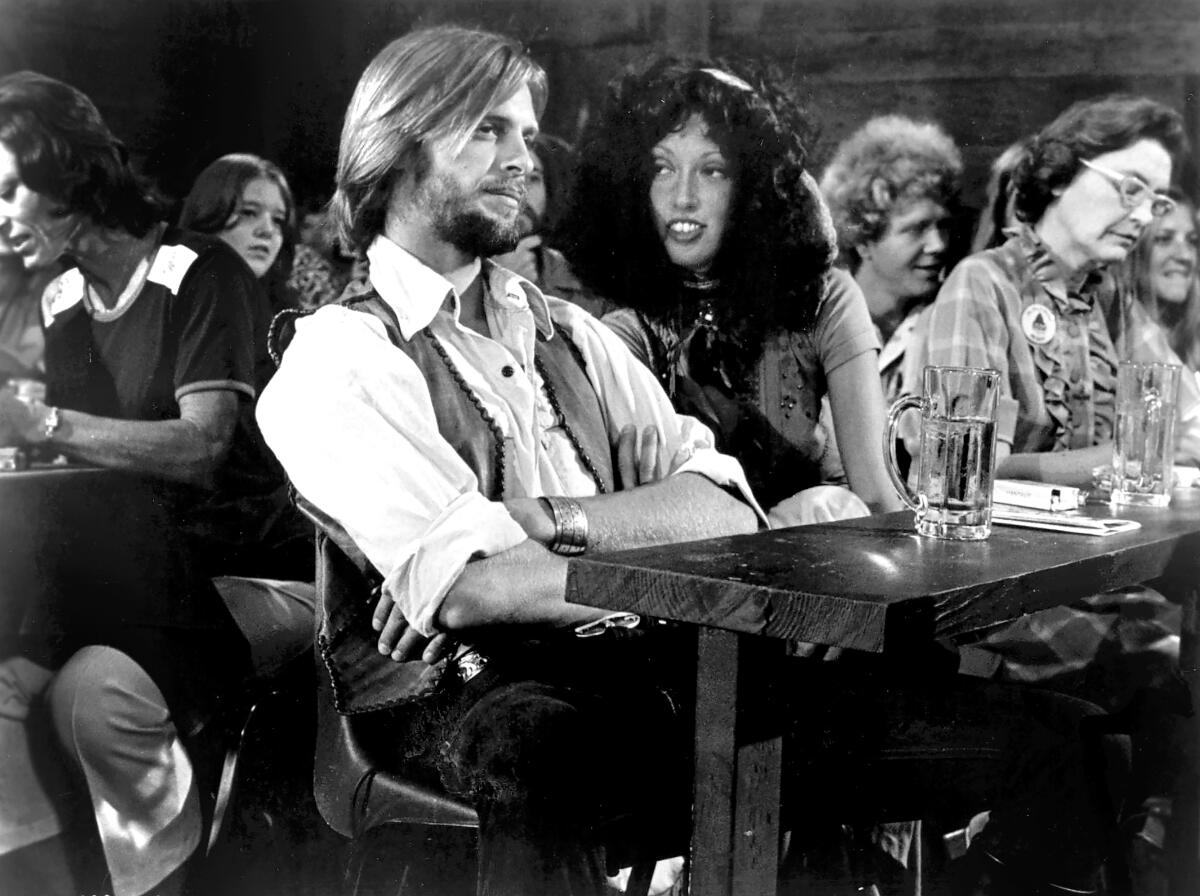
Keith Carradine and Shelley Duvall in the movie “Nashville.”
(Paramount Pictures)
The Egyptian Theatre is launching a series celebrating the movies of 1975. And it was quite a year.
On Monday there will be a 35mm screening of Sidney Lumet’s “Dog Day Afternoon,” which won the first Los Angeles Film Critics Assn. award for best picture (shared with “One Flew Over the Cuckoo’s Nest,” a tie). The screening will be introduced by LAFCA member Peter Rainer.
Werner Herzog will be present for a screening of “The Enigma of Kasper Hauser,” which won the grand jury prize at the 1975 Cannes Film Festival. A screening of “Cooley High” will welcome director Michael Schultz and actors Glynn Turman and Lawrence Hilton-Jacobs for a Q&A moderated by Robert Townsend.
A Tuesday screening of Robert Altman’s “Nashville” will be introduced by Keith Caradine, who won an Oscar for his original song “I’m Easy.” Ronee Blakley, who plays country music queen Barbara Jean and also wrote several songs for the film, will be there for a Q&A after the screening moderated by critic and programmer David Ansen.
In true Altmanesque fashion, “Nashville” features 24 main characters woven together over five days leading up to a benefit concert for an outsider presidential candidate, all intersecting off one another across the city. The cast includes Lily Tomlin, Ned Beatty, Karen Black, Timothy Brown, Gwen Welles, Shelly Duvall, Michael Murphy, Geraldine Chaplin, Keenan Wynn, Scott Glenn and Henry Gibson. In many ways the crown jewel of Altman’s sprawling, prodigious filmography, “Nashville” is a biting satire, by turns rollicking and disturbing, with a still-relevant perspective on the intersection of politics, celebrity and entertainment.
From the moment the film first came out, there has been a debate as to whether it is a cynical put-down of Nashville as an institution and a place, or a celebration of all its gaudy glory. Either way, the film is clearly intended as a broader metaphor for America at a moment when the country was racked by turmoil and transition.
“I think it could be all those things, depending on your viewpoint,” said Blakley in a phone interview this week. “But at the time, I stuck with what I considered it to be — a tribute. I didn’t consider it sarcasm. I thought it was profound and in some ways very deeply respectful of Nashville.”
As for what made the film so special and why its legacy has lasted for 50 years, Blakley said, “I think it’s the concurrence of a bunch of gifted people at that time and place. Nixon was resigning. Altman, I think might be called a genius. It was just a bunch of talent put together by a bunch of great people. And I don’t think you could put your finger on any one thing. You would have to say [cinematographer] Paul Lohmann did beautiful photography. The editing was superb. The performances were just beyond. And the political message, such as it was, is resonant even today.”
Other films in the series include Francis Ford Coppola’s “The Godfather Part II,” Roman Polanski’s “Chinatown,” Steven Spielberg’s “Jaws,” Stanley Kubrick’s “Barry Lyndon,” Hal Ashby’s “Shampoo,” Joan Micklin Silver’s “Hester Street,” Mel Brooks’ “Young Frankenstein” and Chantal Akerman’s “Jeanne Dielman, 23 Quai du Commerce, 1080 Bruxelles.”
‘The 40 Year-Old Virgin’ at 20
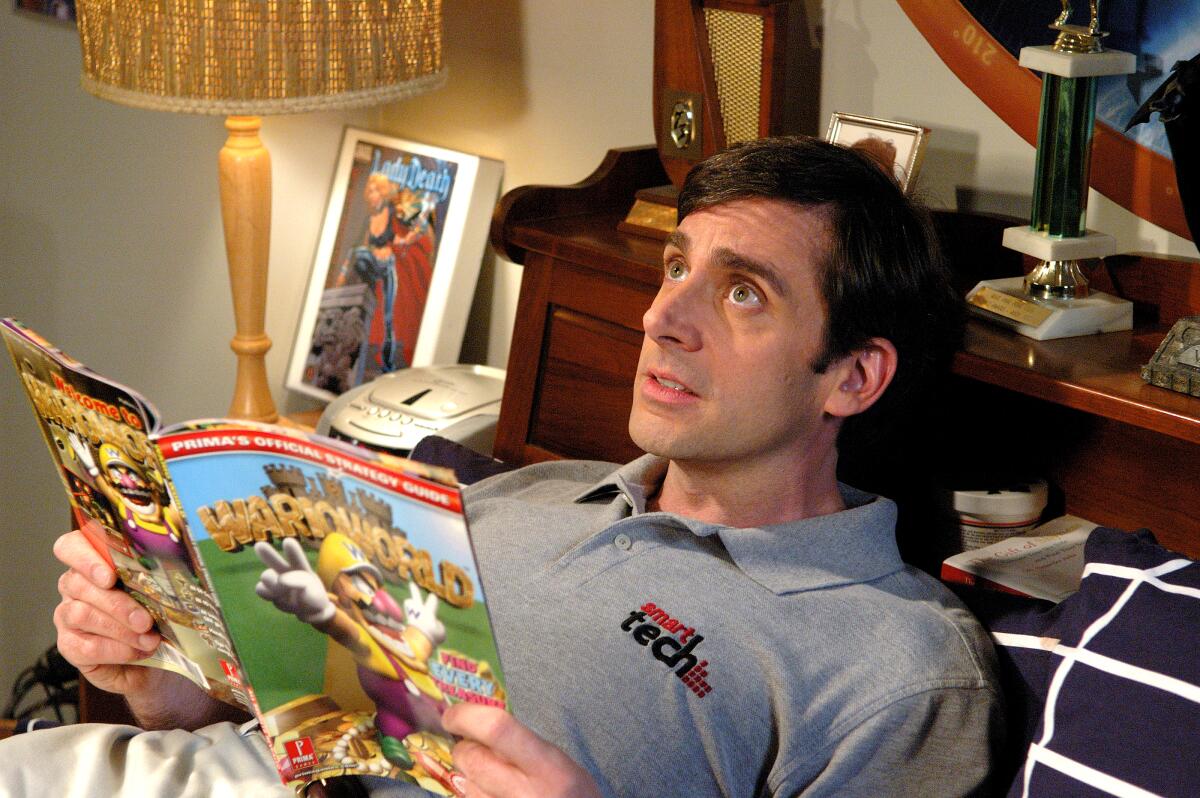
Steve Carell in the movie “The 40 Year Old Virgin.”
(Suzanne Hanover / Universal Pictures)
The Academy Museum will celebrate the 20th anniversary of Judd Apatow’s “The 40 Year-Old Virgin” with a 35mm screening tonight with Apatow and star and co-writer Steve Carell in-person. Apatow’s debut feature as a director, the film was a key title in the 2000s comedy boom. Carell stars as a grown man who is, indeed, still a virgin and is desperate to find someone not only to be physically intimate with, but also to forge a romantic and emotional connection with. The cast, which features Jane Lynch, Romany Malco, Seth Rogen, Paul Rudd, Elizabeth Banks, Nancy Walls, Jonah Hill, Mindy Kaling, Leslie Mann, Catherine Keener and others, is truly stacked, and the film’s finale is so riotously joyful and unexpected that it alone is worth the price of admission.
I actually spent two days on the set of the film, seeing the shooting of a nightclub scene and the now famous poker scene. (I nearly ruined a take by laughing out loud.) “The Office” had only just started to air and Carell’s star was obviously ascendant. As Carell described the film at the time, “The name is misleading to a degree. … Just based on the title, you think it’s going to be this extremely bawdy, over-the-top summer comedy. There are elements of that — really funny set pieces and craziness — but we really wanted something that was grounded in a sense of reality.”
Carell added, “I’ve certainly played a few characters that have been rather broad. With this, I didn’t want to do that. We’ll see. I hope it plays.”
In a review of the film, Carina Chocano confirmed Carell’s hopes, writing, “Not to scare away the kids or anything, but what’s best about ‘The 40 Year-Old Virgin’ isn’t the business with a plastic medical model of a vagina, the projectile vomit or even the onanistic interlude set to the strains of an old Lionel Richie hit (though that constitutes one of the movie’s most enjoyable moments). What’s best about it — aside from the fact that it’s very funny — is that, for a movie in which the most sophisticated jokes are variations on ‘you’re so gay,” it’s refreshingly grounded in reality and (dare I suggest?) emotionally mature.”
Points of interest
‘Kingdom of Heaven’ director’s cut in 4K
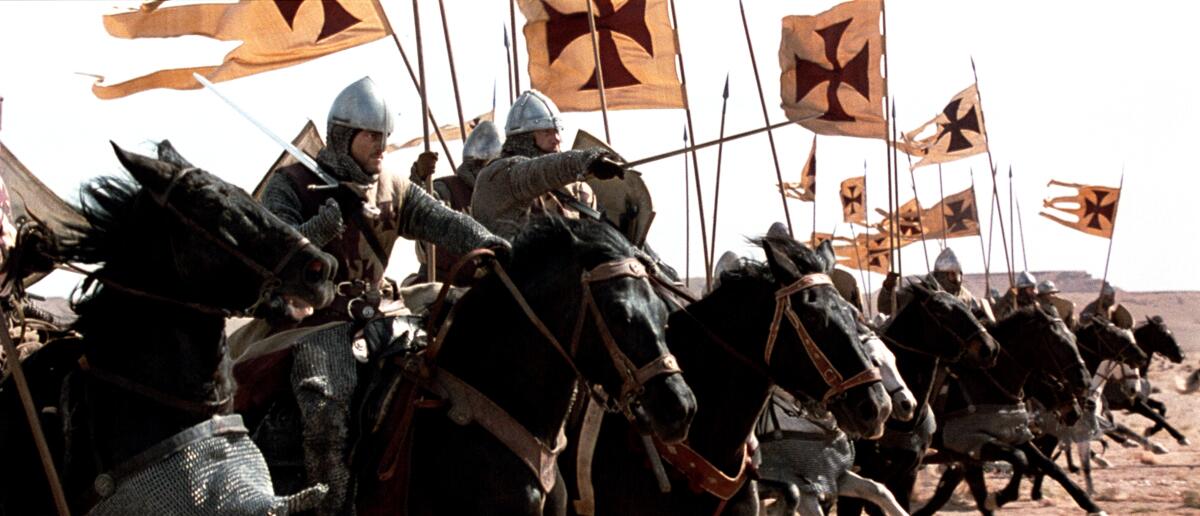
A scene from the movie “Kingdom of Heaven.”
(20th Century Fox)
Tonight the Egyptian Theatre will host the world-premiere screening of a new 4K restoration of the director’s cut of Ridley Scott’s 2005 adventure epic “Kingdom of Heaven,” co-presented by the American Cinematheque and Beyond Fest. As with the extended cut of Scott’s “The Counselor,” the director’s cut of “Kingdom of Heaven” brings a clarity of focus to the film and is vastly preferred to the theatrical version.
Set in the 1100s, the story follows a French blacksmith, Balian (Orlando Bloom), as he joins up with the Crusades and travels to Jerusalem. The cast includes Liam Neeson, Edward Norton, Eva Green, Jeremy Irons, David Thewlis, Brendan Gleeson and Marton Csokas.
In his 2005 review of the original theatrical cut, Kenneth Turan wrote, “‘Kingdom of Heaven’ is not one of those cheerful combat movies that believe bloodletting is the answer to everything. It is a violent movie that laments a peace that didn’t last, a downbeat but compelling epic that looks to have lost faith in the value of cinematic savagery for its own sake. If you combine this film with Scott’s [2001] ‘Black Hawk Down,’ you find the director in a place where he is no longer exulting in his ability simply to put violence on screen; he wants you to feel its searing effects as well.”
“Kingdom” screenwriter William Monahan also wrote the script for Martin Scorsese’s “The Departed,” which happens to be playing at the New Beverly on Saturday and Sunday.
‘M. Butterfly’ in 35mm

John Lone, left, and Jeremy Irons in the movie “M. Butterfly.”
(Geffen Pictures)
On Sunday there will be a 35mm showing of David Cronenberg’s 1993 adaptation of “M.Butterfly” — presented by Hollywood Entertainment and Skylight Books — to celebrate the release of Violet Lucca’s book “David Cronenberg: Clinical Trials.” Lucca will be there to introduce the film and sign books. Screenwriter David Henry Hwang will send in a video introduction. This is said to be the film’s first L.A. showing since 2022.
Hwang, who also wrote the libretto for the opera “Ainadamar” currently at the L.A. Opera, adapted his own play. In the film Jeremy Irons plays a French diplomat in 1960s China who begins an ongoing affair with an opera performer (John Lone) who he believes to be a woman and, it turns out, is also a spy for the Chinese government.
In her book, Luca describes the film as “frequently overlooked in Cronenberg’s filmography” while adding, “it also stands out as the director’s most overtly political work.” Lucca continues, “This tension is perfectly suited to the inexplicable nature of love and sex, the messiness that exists between the spark of desire and its carnal expression. It shatters the illusion that we really do know a partner, or even ourselves — a difficult lesson learned every every day, quietly and loudly, by all sorts of people under far more quotidian circumstances.”
We must not let the memory and value of solidarity with refugees be erased | Refugees
I moved to Lesbos in 2001. This was nearly 80 years after my grandmother had arrived from Ayvalik on this same island as a nine-year-old refugee. She had stayed there for two years before moving to Piraeus. My grandmother was among the nearly 1.5 million Greeks forced to flee Asia Minor in the 1920s.
By 2001, the history of Lesbos as a place of refuge had been almost forgotten by the public, and yet the island continued to serve as a temporary stop for people crossing the Eastern Mediterranean, seeking protection in Europe.
In 2015, Lesbos found itself at the heart of a big refugee story once again. Wars and instability pushed millions to flee across the sea. Almost half of those trying to reach Greek territory arrived on the island.
Lesbos residents found themselves at the centre of a humanitarian response that gained global recognition. It was a time when the world began to talk about the solidarity shown by Greeks towards refugees and migrants, even as the country was mired in an economic crisis.
When I think of the solidarity that flourished during those days, I see outstretched hands along the shores of Lesbos. Countless moving stories emerged of locals helping with whatever they could, carrying food, clothes, and blankets from their homes to feed and dress the newcomers.
As newly arrived people filled the roads of the island, walking towards registration points, not a day went by without the locals giving a lift to a pregnant woman, a child, or a person with a disability we encountered on the way to work. The looks of gratitude, the smiles, the tears, and the endless thank-yous were unforgettable. Solidarity became a badge of honour, and triumphant stories of humanity and hope filled the media.
The island was transformed – its streets and squares filled with locals and newcomers mingling, a scene of human connection and shared humanity.
One day, a refugee family knocked on my door asking to wash their hands and have a little water. They had been on the road for days, sleeping in the park, waiting for a boat to continue their journey. I opened my door and 16 people came inside – among them, eight small children, a newborn, and a paraplegic girl. My small living room filled up; they sat on chairs, the sofa, even on the floor. Before I could bring them water, the children had already fallen asleep, and the adults, exhausted, closed their eyes, their bodies giving in to the weight of their fatigue.
Quietly, I left the room, leaving them to rest. The next morning, they said their goodbyes and boarded the ferry. They left behind a “Thank you” note with a hand-drawn flower and 16 names.
When I think of those days, my mind fills with images: People in the rain, people in the cold, people celebrating, and others mourning their dead. That summer, we attended burial after burial for those who hadn’t survived the dangerous sea journey.
A Palestinian volunteer once told me, “There’s nothing worse than dying in a foreign land and being buried without your loved ones.” When their loved ones weren’t there, we were. The strangers were not strangers to us; they became our people.
In October 2015, a wooden boat carrying more than 300 people sank off the western coast of Lesbos. As the tragedy unfolded, acts of humanity shone through. Locals and volunteers alike, fishermen included, rushed to help, pulling people from the sea and offering whatever comfort they could. Bodies washed ashore in the days that followed, and the morgue filled up.
A local woman held the body of a dead child in her arms. It was a little girl whose body had been found on the beach in front of her house. She wrapped her in a sheet and held her as she would her child – as anyone would hold any child.
Yet, even as the island’s shores became a symbol of solidarity, the shifting tides of European border policies were already beginning to reshape the reality for those arriving.
A few months later, Europe’s border policies changed, trapping asylum seekers on the island. The EU-Turkiye deal mandated that asylum seekers remain on the island where they landed while authorities assess whether they could be returned to Turkiye, deemed a “safe third country”.
The deal demonstrated that the European Union was ready to deviate from the basic principles of the rule of law and that border procedures and the safe-third-country concept were dangerous for the lives of refugees and migrants. It represented a frontal attack on international refugee and human rights protections, further instrumentalising people’s suffering.
Unfortunately, these policies have intensified since, and were eventually institutionalised at the state level, especially with the amendments of the Common European Asylum System (CEAS), adopted in May 2024. The reform marked a radical shift in the EU rulebook for the worse, institutionalising discriminatory treatment of refugees, regimes of derogation, the revocation of basic rights and legal protections, and the imposition of extended and mass detention.
Back on Lesbos, I watched the smiles of people fade, along with their hopes, crushed inside and around the Moria camp, which had emerged in 2013 as a significantly smaller facility, never intended to accommodate the thousands who later stayed there. The mental health of the refugee and migrant population plummeted, with a significant rise in suicide attempts.
As the number of people increased, the appalling conditions, shortages, overcrowding, and extreme uncertainty created a desperate daily reality, one that bred frustration, anger, and sometimes violence. It was then that the authorities and media began to change the narrative. No longer were refugees and migrants portrayed as desperate souls arriving in the country and suffering in camps. They were now framed as a threat to the country.
Solidarity became part of the problem. It became a public insult, a mockery. Although NGOs and volunteers were called upon to provide food and services, and fill the endless gaps in humanitarian assistance, they were simultaneously accused by authorities of corruption and criminality. Common sense, humanity, and solidarity – the fabric of social cohesion – became targets. Society grew divided.
Xenophobic policies prompted xenophobic headlines, rescuers were persecuted, and increasingly racist voices dominated public discourse, threatening the memory of this island where humanity once thrived.
The events of 2015 were portrayed as a massive disaster that should never happen again. The miracle of solidarity, which brought global attention, resources, and solutions to an immense humanitarian crisis, was slandered. Policies of deterrence, pushbacks, refugee camps-turned-prisons, and the criminalisation of solidarity and civil society were presented as the only solutions. The polarisation deepened, escalating violence against asylum seekers, refugees, and solidarity workers.
The Moria camp – a place that can only be described as a graveyard for human rights – became a ticking time bomb for the island’s residents. At its peak, it devolved into a vast settlement of tents and shacks, with no access to potable water, hygiene, or basic necessities.
One afternoon in October 2016, I found myself in Moria, waiting for our interpreter so we could inform a family about their asylum interview date. As time passed, dark clouds gathered. Around me, people carried their belongings, children played in the dirt with whatever they could find, and young men hauled cardboard and plastic to shield themselves from the coming rain.
Standing there in the midst of it all, I watched a struggle for survival in conditions none of us would accept to endure for even an hour. Yet, every so often, someone would approach me – offering water, tea, or a piece of cardboard to sit on so I “wouldn’t have to stand”. The smiles of refugees made me feel so safe and so cared for, their humanity steadfast despite everything.
As the clouds thickened, I moved to help a woman secure her tent with stones. I bent down to add a few myself and saw that the tent was filled with small children. How could so many children fit into such a tiny tent? I admired her courage and determination to protect them. I smiled at her, and there, in the middle of nowhere, standing before a tent that the rain could wash away at any moment, she took my hand and invited me to share their meal.
How could such extremes fit into a single moment? The squalor, the inhumanity of the conditions, and yet, the hospitality, the need for one another, and the strength they gave even in the harshest of circumstances. How could one moment capture both need and dignity, desperation and generosity – the stones they used to anchor their tents also anchoring our shared humanity?
Back in town, where the voices against refugees and migrants were growing louder, I went to the supermarket. As I was standing in line, the woman in front of me turned to me and complained, “We’re overrun with foreigners. They’re everywhere. What’s going to happen with them?” She gestured towards a young African woman at the checkout counter.
The other customers nodded grimly. I thought about how to respond as I watched the young refugee woman place her few items on the counter. She then realised she didn’t have enough money and started to put back the few apples in her basket.
I looked at the woman in front of me watching the scene unfold. Fearing she would start shouting, I held my breath. Instead, with a decisive motion, she picked up the apples. “I’ll pay for these, my girl,” she said to the young woman, who looked at her in confusion. “Take them, don’t leave them.”
The young woman thanked her, hugged her, and left. And I heard the older woman mutter to herself, “What can they do? Who knows what they’ve been through? But what can we do, too?”
The op-ed is written on the occasion of the series of illustrations Kindness beyond boundaries, released by UN Human Rights, Refugee Support Aegean (RSA), the Greek Council for Refugees (GCR) and PICUM (Platform for International Cooperation on Undocumented Migrants), an initiative towards building a counter-narrative to the criminalisation of solidarity.
The views expressed in this article are the author’s own and do not necessarily reflect Al Jazeera’s editorial stance.
Michael van Gerwen ditches ‘lower priority’ World Cup of Darts to go on holiday to Ibiza instead
MICHAEL van Gerwen has ditched the “lower priority” World Cup of Darts for IBIZA.
The three-time World Champion MVG will not play in Frankfurt on June 12-15 with Gian van Veen now expected to partner Danny Noppert for the Netherlands.
World No.3 Van Gerwen’s absence shocked fans.
But close pal and former pro Vincent van der Voort wasn’t surprised.
He said on the Darts Draait Podcast: “I already knew back in December – his holiday was booked by then.
“I think he’ll be on a very big boat near Ibiza around that time. It’s all very inconvenient, of course.”
Podcast host Damian Vlottes joked: “If the choice is between that or the Eissporthalle in Frankfurt, I think I’d know what to pick.”
Former UK Open finalist Van der Voort backed MVG’s decision.
He added: “Playing for your country is a great honour, but let’s be honest, the World Cup of Darts was somewhat forced into the calendar.
“We looked at the schedule, and Michael wants to be at his best in the autumn. That means something has to give.
BEST ONLINE CASINOS – TOP SITES IN THE UK
“He wants to be fresh for the second half of the year, which is why his holiday falls during the World Cup. It’s a matter of making choices.
“The World Cup just has a lower priority at the moment. Maybe he’ll return to it next year.”
Van Gerwen will take a leaf out of wife Daphne’s book, who was seen soaking up the sun in a bikini on holiday last month.
She was hailed as “super beautiful” by fans after posing in Turkey in photos with her mother and looking out to a scenic ocean view.
The pair have been married since 2014 and are parents to daughter Zoe, 7, and son Mike, 5.
Half a century on the beat, and thank you very much
The Bard of Los Angeles was waiting for an elevator when I arrived at the office one day in 2002. Columnist Al Martinez and I greeted each other, and with a mixture of pride and disbelief, he shared a milestone.
“This is it,” he said. “Fifty years in the business.”
Martinez was in his early 70s and said he had no intention of slowing down. You’d have needed a tranquilizer gun to keep him from chasing after the next story, and the next, and he was still telling stories until his death in 2015.
I was a full generation behind him, and had trouble imagining myself at his age, still on the beat.
But time did what it does.
It vanished.
Now I’m in my early 70s, and I’m stealing Martinez’s line.
This is it. Fifty years in the business.
Nathaniel Ayers and Yo Yo Ma at Walt Disney Concert Hall in 2006.
(Francine Orr/Francine Orr)
(Rick Loomis/Los Angeles Times)
Newspapers have soared and sputtered in that time, rising to hero status half a century ago for taking down a crooked president, only to be called the enemy of the people by the current occupant of the White House.
In Al Martinez’s heyday, an errant toss of the Sunday L.A. Times could have maimed a standard poodle. But a tsunami of disruption, starting with the rise of the Internet in the 1990s, swamped the news and advertising industries, driving thousands of newspapers and magazines under or put them on life support, critically damaging one of the pillars of Democracy.
This is an excellent moment in history to be a crook, a liar, a gasbag or a double-dealing political hack, because there are far fewer reporters rooting around like drug-sniffing airport dogs.
But don’t worry, I’m not going to mark this anniversary by rambling on and on about the death spiral, other than to remind you to renew your subscription immediately.
I’m here to tell you how lucky I’ve been for half a century, why I wouldn’t change a thing if someone loaded me into a time machine, and why, even though I’m buckled into a seat on the Hindenburg, I still want to order a few more cocktails before we crash-land.
To be honest, I did have a moment of doubt about my career choice after leaving San Jose State University on a Tuesday night in May of 1975 and starting work the next morning at the Woodland Daily Democrat. Woodward and Bernstein had just changed the world with their muckraking, and what was I doing with my brand-new degree in journalism? I was covering Little League baseball in Davis, an exercise in recycling adjectives to describe home runs that were clobbered, ripped, slugged, rocketed, smoked and launched.
Boyle meets with Jose Trujano in October 2022.
(Genaro Molina / Los Angeles Times)
But I had a foot in the door, as they say, and shamelessly stalked editors at other newspapers, begging for work. I’d discovered an essential truth about a job in which you’re supposed to go fishing for stories, knock on doors, rattle cages, call out the posers, meet up with life’s winners and losers, and then sit down at a keyboard, take a deep breath, and do your best to turn a blank page into a postcard one day, an indictment the next:
It never really feels like a job.
For 50 years, I’ve been enrolled in a continuing education course, learning a little more each week about this and that, with no end to the variety of topics or the cavalcade of characters and crackpots, dreamers and dropouts.
My L.A. professors have included barbers (Lawrence Tolliver), patron saints of second chances (Father Gregory Boyle), social workers (Mollie Lowery and Anthony Ruffin), and a homeless musician who taught me more about humility, hope, and the shame of L.A.’s unsolved catastrophe of homelessness than anyone else (thank you Mr. Ayers, a thousand times, thank you).
I’ll admit that when I arrived in Los Angeles in 2001, I was a bit worried about whether, as a transplant, I’d make a fool of myself in print, or have trouble finding enough good stories in a place where I knew only a handful of people and little of the political landscape.
But a press credential is like a passport, and it gets you onto front porches and into living rooms where people have stories to tell, some that lift you up and others that break your heart. And I was helped along by the daily flow of breaking news, which doesn’t trickle — it gushes. As if from a fire hose.
I hadn’t been here long before the local franchise of the Catholic Church firmly established itself as one of the more egregious offenders in a sprawling sexual abuse scandal. And then an action hero decided to run for governor, and I went to Beverly Hills to see if Arnold Schwarzenegger’s barber could give me the same hairdo and Woody Woodpecker dye job (I had hair at the time, but looked pretty ridiculous for a few weeks).
As I began to find my way, Los Angeles became my home, and it was a different place than the one I had imagined from afar.
This city of millions is millions of different things, organically immune to being entirely understood or neatly described. You have to keep exploring, as if each story is the first page of a mystery. The real love affair with L.A. begins when you recognize the existence of a place, unique in the world, that lies beyond all the lazy cliches and pompous proclamations.
(Los Angeles Times)
In covering L.A., I’m guided by something a Philadelphia Inquirer editor named Ashley Halsey told me by phone at the end of the first Gulf War, when I was reporting from a Kurdish refugee camp in the mountains between Iraq and Turkey. I watched families bury loved ones in a muddy cemetery and was at a loss to convey the enormity of the moment, set against the panorama of geopolitics.
Halsey told me he didn’t want a panorama. He wanted a snapshot. Count the graves, describe the terrain, talk to survivors. Put readers in the cemetery.
Good advice.
It works well, by the way, when you’re writing about ruptured sidewalks in Los Angeles. And this reminds me that I want to thank every mayor and council member, going back many years, who have contributed to the current embarrassment of spectacular disrepair, in which the waiting time for the city to come by and fix a sidewalk is 10 years (spoiler alert, I’m working on another chapter of the story as you read this).
I owe a garden of roses to my wife, for years of support, guidance and religiously reading the newspaper, despite having to put up with my story-juggling distractions and constant carping about the trajectory of the news business.
And to the hundreds of reporters, photographers and editors I’ve learned from and been inspired by — at the Woodland Daily Democrat, the Pittsburg Post-Dispatch, Concord Transcript, Oakland Tribune, San Jose Mercury News, Philadelphia Inquirer, Time Magazine, and the L.A. Times, where, countless times, my columns were informed by the ace reporting of my colleagues.
We are, tragically, fewer in number, but the mission has never been more vital.
And one last thank you:
The best part of the last 50 years has been my relationship with readers.
Not every one of you, to be honest. There’s a lot of anger out there, from people who disagree, think I’m a moron, or wonder why I haven’t followed up on their ideas.
(Brian van der Brug/Los Angeles Times)
But I’ve tried to make the column a running conversation, and I thank you for the feedback — positive and negative — as well as all the story ideas. Thousands of exchanges over the last 24 years, by email, by phone and in person, have helped me better understand Los Angeles and all the frustrations and joys of living here. I get backed up and am not as responsive as I should be, but I do not take this relationship for granted. In fact, I consider it a privilege.
So yes, 50 years and counting, and in the spirit of Al Martinez, on to the next, and the next.
Send me a story tip or two, will you?
Moyes & Pickford share favourite Goodison Park memories
Everton’s David Moyes and Jordan Pickford tell Football Focus their favourite memories of being at Goodison Park as the club gets ready to move to a new stadium next season.
Source link
Prince Harry loses appeal for higher security level in Britain

May 2 (UPI) — Britain’s Prince Harry, the duke of Sussex, will not get increased taxpayer-funded security while in that country after losing a legal battle Friday.
Judge Sir Geoffrey Vos ruled against Harry’s legal team in the British Court of Appeal, arguing he “could not say that the duke’s sense of grievance translated into a legal argument for the challenge to Ravec’s decision.”
Security for the prince and his family will now remain below the level normally provided to other Royal Family members by the Royal and VIP Executive Committee.
Harry’s level of security protection while in Britain was downgraded in 2020 when he and wife Meghan Markle, the duchess of Sussex, announced they would “step back” from their duties as members of the Royal Family.
The family argued that the reduced security forced them to stop regularly visiting Britain because of safety concerns.
Harry and Meghan moved to Southern California after stepping back from the Royal Family, where they continue to reside.
Last year, Harry lost a decision in Britain’s High Court of Justice to have the regular security level reinstated. He took his fight to the British Court of Appeal, which heard the case last month over two days in London.
Lawyers for the youngest son of King Charles III, had previously argued that Ravec’s treatment of Harry, his wife and two children was unlawful. They accused the agency of targeting the family through a “bespoke process” and Harry was “singled-out for different, unjustified and inferior treatment.”
Britain’s High Court rejected the arguments, calling the Ravec decision “legally sound.”
“Even if there had been a risk analysis from the risk management board, it would very likely have only confirmed the threat, vulnerability and impact levels which the Duke of Sussex had faced when earlier risk analyses were undertaken,” Vos, the President of the court’s Civil Division, wrote in his ruling Friday.
“But it would have had nothing to say on the critical features of the changed situation, namely the need for protective security on future uncertain visits and the government’s appetite for risk.”
Former Tunisian premier sentenced to 34 years in prison – Middle East Monitor
Former Tunisian Prime Minister and deputy head of the Ennahda Movement, Ali Laarayedh, was sentenced to 34 years in prison on terrorism-related charges, media reports said Saturday.
Tunis Afrique Presse, (TAP), citing judicial sources, said Laarayedh and eight other defendants were charged with aiding the formation of a terror organisation, joining such a group within Tunisia, and facilitating the travel of Tunisian youth abroad to join terror groups.
The case is known as the “human trafficking trial.”
All defendants were sentenced to terms ranging from 18 to 36 years for allegedly trafficking individuals to regions where the Daesh/ISIS terror group is active.
READ: Tunisia: authorities are putting democratic transition on trial, claims Ghannouchi adviser
BBC Saturday Kitchen halted as star shares ‘touching’ update leaving host emotional
Saturday Kitchen host Matt Tebbutt was lost for words when wine expert Helen McGinn halted the show to share some exciting news.
Saturday Kitchen host Matt Tebbutt was left “touched” and “speechless” after wine expert Helen McGinn brought the show to a standstill with her heartfelt praise for the beloved TV chef.
Matt was in the running for a significant food and drink accolade, prompting Helen to seize the moment to share some uplifting news with the BBC presenter and the audience at home.
Early into the programme, Helen cut in to announce that Matt had clinched a prestigious award, placing him at the pinnacle alongside some of the culinary world’s finest chefs.
Since he couldn’t be there to accept his prize, the sommelier represented him at the event and proudly collected the award on his behalf.
Helen revealed: “Unfortunately you were working on Thursday so you had to miss out on one of your favourite nights of the year, but I stood in for you and believe me I gave it a really good go.”
The TV chef quipped in response: “You sent me a message at like 2am in the morning.” To which Helen playfully shushed him, eliciting laughter from everyone on set, reports the Express.
Continuing with the announcement, she disclosed: “As our viewers know, you were nominated for the Fortnum and Mason Food and Drink Awards for the Food Personality Of The Year.
“It was a public vote and you were up against some really big names, the biggest names in the world of food, including Rick Stein, Nadyia [Hussain], Jamie Oliver, Dame Mary Berry and our wonderful viewers, they voted en masse and… You won, congratulations.”
The wine expert then put the bashful host on the spot, requesting: “Now obviously you weren’t there to make an acceptance speech on the night, so over to you. Is there anything you would like to say?”
Matt, clearly caught off guard, responded: “Do I have to stand up?” Helen, appearing to relish the moment, fired back: “Yes you do, I know you’ll enjoy this.” She explained to other guests on the show: “He’s not very good at taking compliments so he’ll be hating this.”
The Saturday Kitchen presenter admitted: “I don’t like doing things like this, I’m only good with autocue.”
He continued: “Well listen, thank you very much, this is obviously a huge honour, it’s a lovely thing to have and thank you for all of you guys who voted for me, I am really touched and I don’t know what else to say so thank you.”
With a beam, he addressed the audience: “Strangely, I don’t actually like being the centre of attention but that is wonderful, so thank you very much.”
Helen gave Matt another round of applause, saying: “Aww well done.”
Saturday Kitchen airs every Saturday on BBC One, from 10am.

